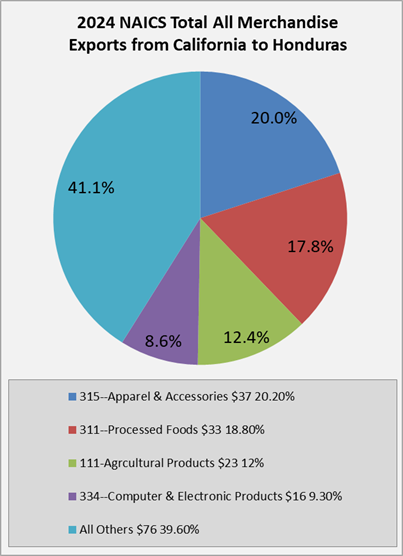Trading Partner Portal: Honduras
Overview
Trade Overview

The World Bank classifies Honduras as a lower middle-income country in Central America and geographically, Honduras is slightly larger than Tennessee. Honduras has a population of 10.7 million people, a nominal GDP of $37 billion, and nominal GDP per capita of $3,446.
Honduras’ economy relies heavily on the trade relationship it retains with the United States. Historically, Honduras’ economy has been dependent on the export markets of agricultural goods, such as bananas and coffee. However, as development furthers, the economy has expanded to an export market based on a majority of apparel and automotive products. World Bank, CIA
U.S. – Honduras Trade
The United States is not only one of the top export destinations for Honduran goods, but it is also one of the top sources of products for goods imported from Honduras. Two-way trade between both countries was $12.63 billion in 2024. The United States exported over $7.10 billion of goods into Honduras; over $2.07 billion was petroleum and coal products. Other exports into Honduras included textiles and fabrics ($997 million), processed food ($663 million), agricultural products ($587 million), and other special classification provisions ($438 million).
In the same year, the U.S. imported $5.53 billion worth of goods from Honduras. A majority of those goods were apparel and accessories ($2.32 billion). Honduras’ other key imports were transportation equipment ($1.10 billion), agricultural products ($851 million), processed foods ($269 million), and primary metal manufactures ($236 million). U.S. Department of Commerce
Honduras – California Trade

In 2024, California exported approximately $185 million worth of goods to Honduras. The main exports were products in apparel and accessories ($37 million), processed food ($33 million), agricultural products ($23 million), computer and electronic products ($16 million), and electrical equipment, appliances, & components ($13 million).
California imported $150 million worth of goods from Honduras in 2024, with $69 million in agricultural products being the top import. Other key imports were apparel and accessories ($43 million), processed food ($29 million), reimports ($2 million), and wood products ($2 million). U.S. Department of Commerce
FDI- Honduras
In 2023, U.S. FDI into Honduras totaled $1.4 billion, while Honduran FDI into the U.S. totaled $-40 million, a decrease of over 70 percent from 2022. (Bureau of Economic Analysis).
More articles:
Preliminary Overview of the Economies of Latin America and the Caribbean
ECLAC, December 2019
WTO Trade Policy Review: Honduras (05/04/2016)
The World Trade Organization’s conducted a review on the practices and policies in regards to trade of Honduras based on reports from the Government of Honduras and the WTO Secretariat. (05/04/2016)
Trade Agreements
Trade Agreements
Yes, Really: It’s Time to Revive Hemispheric Trade Talks
Latin Trade, August 6, 2020
CAFTA-DR (Dominican Republic- Central America Free Trade Agreement)
The United States trade deal with some of the small developing countries in Central America was signed by President George W. Bush in 2005 as an expansion of North American Free Trade Agreement for the US. Members of this free trade agreement include the United States, Costa Rica, El Salvador, Guatemala, Honduras, Nicaragua, and the Dominican Republic. This trade agreement has led for this group to become the US’s 16th largest trading partner in commodities. Exports from the United States to this group of countries totaled $29 billion in 2015, while imports totaled approximately $24 billion. This trade agreement ensures that 100% of goods from the United States are not subject to tariffs in these countries, it also has a goal of phasing out all tariffs on agricultural products by 2020.
Events
Events
Central American Ambassadors Promote Benefits of Trade Agreement with U.S. (03/08/2005)
The California Chamber of Commerce hosted five ambassadors representing the nations included in the proposed U.S.- Central American Free Trade Agreement (CAFTA) at an International Luncheon Forum on March 8, 2005.